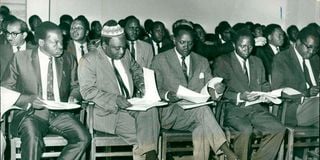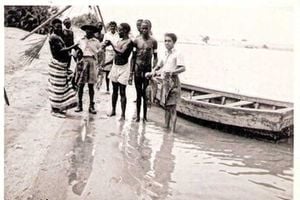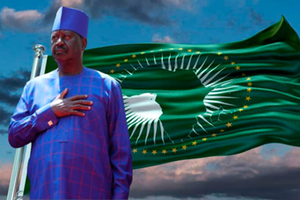
On Friday, August 3, 1962, James Gichuru, Kenya’s new minister for Finance, was in London for talks with the Secretary of State for the Colonies, Duncan Sandys. A luncheon was held at Marlborough House for the visiting delegation, which consisted of Masinde Muliro, Tom Mboya, Taita Towett, Bruce Mackenzie, N.S. Carey Jones, among others.
Then, Gichuru vanished into thin air. For an entire weekend, nobody knew the whereabouts of the minister. Questions were being asked whether leftists had kidnapped him.
While the disappearance was later trivialised – the minister loved his beer – it reflected the paranoia and suspicion prevalent at the time, especially as newly independent states navigated their positions between Western and Soviet influences.
It also reflected on a character that would later emerge – had there been vetting of ministers.
The importance of this article is that we tend to overlook some small things when vetting, and they can have ramifications later.
I am saying this after watching the choreographed circus, we call vetting at Parliament. It was not worth the effort.
Gichuru was leading the Kenyan delegation, and talks had been organised as the country accelerated towards independence.
Time was of the essence, and loans and agreements had to be signed. The British loved Gichuru because of his moderate politics, his other weaknesses notwithstanding.
The story of the Kenyan minister disappearing in London was intriguing, and police had no idea where he had vanished to. An alert was issued, and Gichuru was declared “lost”.
The Kenyan delegates were also shocked, while Kenyan agent in London, M.H. Archer, was at a loss to explain the whereabouts of the minister who was supposed to board a train to Edinburgh.
While this may appear simple, it shows the casual manner in which Britain treated the Kenyan political delegations at the dawn of independence.
This was not an ordinary meeting. Gichuru led a delegation to finalise the future of European settlements in Kenya and was to leave for Germany to sign a £3 million loan.
He was also to discuss a crash programme with the Colonial Office to reduce unemployment.
Planned too was a meeting in Rome, Italy, where Gichuru was to meet representatives of a construction and engineering firm, Impressit, best known for building Kariba Dam.
In Italy, Gichuru was to meet United Nations Food and Agriculture Organisation officials and conclude a $1 million Tana River project.
But then, Gichuru was nowhere to conclude the London leg of the trip and prepare for the next.
As it was explained later, Gichuru had arrived early at the train station and did not know that three trains were to leave for Edinburg within the hour.
“When he got to the station,"he climbed on the first train signposted to Edinburgh. The train he caught was not the one on which a sleeping berth had been reserved, and Mr Gichuru sat up all night on the journey,” Archer explained.
According to that version, Gichuru had thought that only one train served the London-Edinburg route – as it happened in Kenya, where there was a single evening train between Nairobi and Mombasa and Nairobi to Kisumu.
Things then went awfully wrong for Gichuru.
“When he arrived in Edinburgh, the person who was supposed to meet him of course was not there,” said Archers.
Interestingly, Gichuru only had the person’s name but not his address.
Gichuru’s lack of detailed contact information for his host in Edinburgh was may have been a reflection of the less formalised arrangements that characterised diplomatic missions from newly independent states. It could also reflect on his intentions.
It was reported that Gichuru made some inquiries at the station on whether anybody had been waiting for him. There was none.
He was then directed to the British Council offices, but he found that they had been closed for the weekend. By that time, Gichuru had been reported “lost”, and the delegation had no clue where he was after checking out of the London Hotel.
It was a weekend. As Gichuru explained later, he took a taxi to a hotel where he stayed for two nights.
And what was he doing in Edinburgh all alone away from the Kenyan delegation?
The explanation was that “he spent the time sightseeing in Edinburgh” and according to Archer, Gichuru “thoroughly enjoyed himself”.
It was after a weekend of leisure that Gichuru – who had no idea that he had been declared lost – arrived at Edinburgh Station to take the 10.30 pm train to London.
By then, an alert had been issued, and police easily recognised him as the “lost” Kenyan minister.
Gichuru returned to London and kept his breakfast appointment at the colonial office. This meeting concluded the financing of an expansion of Sasumua Dam and the slum clearance in Pumwani, at a cost of £1.5 million.
But only Gichuru knew where “James Gichuru” was.
**
While the London drama was quickly forgotten, Gichuru’s challenges became obvious after independence.
It was interesting that Jomo Kenyatta could hardly dismiss the man who twice vacated his seat to allow Kenyatta to shine.
Gichuru vacated the Kenya African Union seat and Kanu presidency for Kenyatta.
This is why this story is important. Presidents in Kenya tend to retain ministers and Cabinet secretaries on account of past friendships and homeboy connections. Finally, it is the Kenyans who suffer the embarrassment.
Fast forward to the state opening of the Central Bank of Kenya (CBK) on September 14, 1966.
Finance minister Gichuru was supposed to be beside President Jomo Kenyatta as he cut the tape. But it was Mwai Kibaki, the minister for Commerce and Industry, CBK Governor Leon Baranski and Head of Civil Service Duncan Ndegwa, who were beside the President.
Once again, Gichuru had vanished. According to Ndegwa, “four hours before the opening of CBK by the president, Gichuru failed to wake up”.
Gichuru is an example of when Kenyatta retained a Cabinet minister based on friendship rather than performance.
In his book Walking in Kenyatta’s Struggles, Ndegwa says Gichuru had a drinking problem. Government documents would occasionally be found at Karai Bar in Nairobi’s River Road.
On that day, the Minister for Defence had to run to Gichuru’s office to look for the written speech.
Running the ministry had been left to young John Michuki as Gichuru became one of the Kenyatta government’s “untouchables”.
“Year after year, Michuki reported the minister’s failure to react on policy choices,” wrote Ndegwa.
But Gichuru had little interest in amassing wealth or crossing people’s paths.
As Ndegwa noted in the book, he had “good common sense but lacked focus”.
At 68, he died after losing his seat to Jonathan Njenga, former Principal Immigration Officer, in 1979.
Interestingly, Gichuru, though a prominent figure in the independence struggle, needs to be studied more.
Because of his later failings as a human being, history tends to ignore him.
Of course, Gichuru played a major role as a moderate and represented some class interests.
However, his retention as Minister for Finance and later Minister of Defence was a powerful indicator of how Jomo Kenyatta saw him.
Whether he performed is another story.










